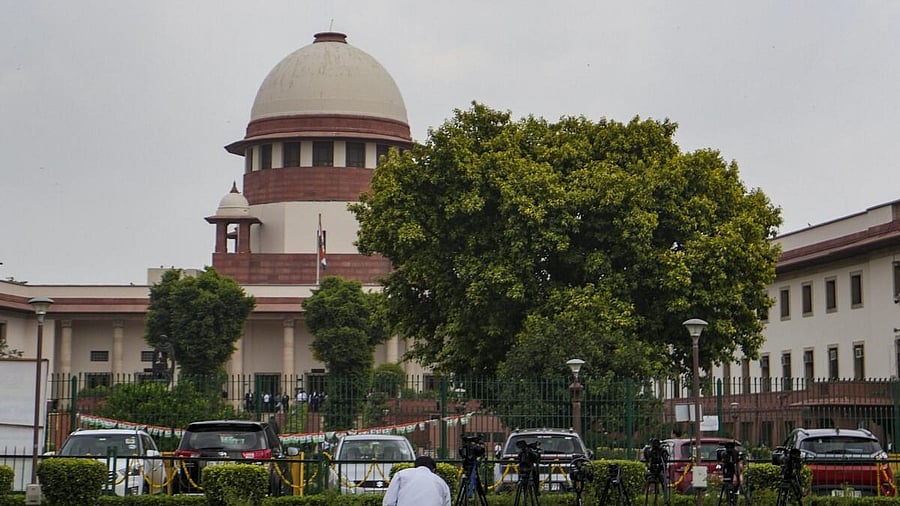
Supreme Court of india.
Credit: PTI Photo
New Delhi: The Supreme Court on Friday favoured adopting Blockchain technology to deal with a dichotomy between registration and ownership under the property laws, and to transform land registration into a more secure, transparent and tamper-proof system.
The top court asked the Law Commission to examine the issue as it involved restructuring and reviewing existing laws, i.e. the Transfer of Property Act, 1882, Registration Act, 1908, Stamp Act, 1899, Evidence Act, 1872, Information Technology Act, 2000, Data Protection Act, 2023.
A bench of Justices P S Narasimha and Joymalya Bagchi passed the direction in context of reformation of land registration processes and to eschew fraudulent or multiple registration.
The court said, the blockchain technology has garnered particular attention for its potential to transform land registration into a more secure, transparent and tamper-proof system.
The bench said property purchase has not been easy; it is not difficult to find people grudgingly telling us that it is in fact traumatic.
"The present system of presumptive title through registration is also the primary contributor to high volume of land related litigation in India. Property disputes account for an estimated 66% of all civil cases. More than a century has passed by, and we must dare to think and look for alternatives,” the bench said.
The court struck down Rule 19 of the Bihar Registration Rules, 2008, which empowered registering authorities to refuse registration of documents, if proof of mutation of the property under sale in favour of the vendor is not produced along with the registering document. The bench held that these provisions were ultra vires the Registration Act.
In its judgment, the court noted the legal framework for purchase and sale of immovable properties suffered from several systemic deficiencies that undermine reliability, transparency and efficiency.
There are problems relating to fake and fraudulent property documents, rights and liabilities, land encroachments, delay in verification processes, and role of intermediaries etc, the bench pointed out.
The court suggested that adoption of Blockchain technology would ensure immutability, transparency and traceability, thereby minimizing fraud and unauthorized alterations.
The bench said blockchain technology is said to offer an alternative paradigm by encoding land titles, ownership histories, encumbrances, and by recording transfers on a distributed Ledger in an immutable and time stamped form.
Justice Narasimha, who authored the judgment on behalf of the bench, said each entry, once validated into the distributed ledger, becomes part of a cryptographically linked chain of information that cannot be retroactively altered without detection.
“This property of immutability could enhance the integrity of title records and strengthen public trust in the ownership framework. This cryptographic immutability could perhaps address the structural fragility of the Indian record keeping system,” he wrote for the bench.
The court said the blockchain design could integrate cadastral maps, survey data, and revenue records into a single verifiable framework, which, while maintaining a transparent audit trail, is accessible to multiple departments and the public.
The bench felt there is now a possibility of overcoming the binary that the laws have created in maintaining a register for transfers for long, but have neither granted credibility or conclusiveness of title.
“At the same time, the process of registration is cumbersome and time-consuming. Registration of deeds being a concurrent list subject, the government of India must take lead in constituting a body, with the participation of the states, to examine this issue in light of the technological advancement for integrating the property registration regime with conclusive titling,” the bench said.
The court requested the Law Commission to examine the issue in detail, consult the Union, the States and all other stakeholders as well as experts in the field of information and technology, and prepare a report on the issue.
The court pointed out that the legal architecture for property transactions in India continued the colonial construct of real property and operated on the basis of three primary legislations-all of them century-old, the Transfer of Property Act, 1882, the Indian Stamp Act, 1899 and the Registration Act, 1908.
The court highlighted the constitutionally protected right to own immovable property inherently includes the freedom to freely acquire, possess and dispose of it at will.
“The efficiency and transparency with which immovable property is bought and sold is demonstrative of a nation’s institutional maturity and a testament of the confidence and trust its citizens repose in the integrity of its legal and transactional framework,” the court said.
The bench pointed out the Registration Act, 1908, mandated the registration of documents, not titles, and this distinction forms the cornerstone of our country’s presumptive titling system.
Since this presumption is rebuttable in a court of law, a substantial burden rests on the prospective buyer, who must undertake a painstaking search of title, it added.
The court found that this uncertainty has been distressing for those seeking to purchase property and property disputes, in fact, constitute nearly 66 percent of all civil litigation.
“It is therefore fair to ask whether the time has come to move towards a system in which the sale and purchase of immovable property become simpler, and registration serves as a conclusive proof of ownership guaranteed by the State,” the bench said.
The bench said until the convergence of conclusive titling with registration is achieved, constitutional courts must balance the freedom to buy and sell property with the governmental duty to ensure integrity in transactions.
